人教版英语九年级全册Unit 4I used to be afraid of the dark. 复习课件 (共46张PPT)
文档属性
| 名称 | 人教版英语九年级全册Unit 4I used to be afraid of the dark. 复习课件 (共46张PPT) | 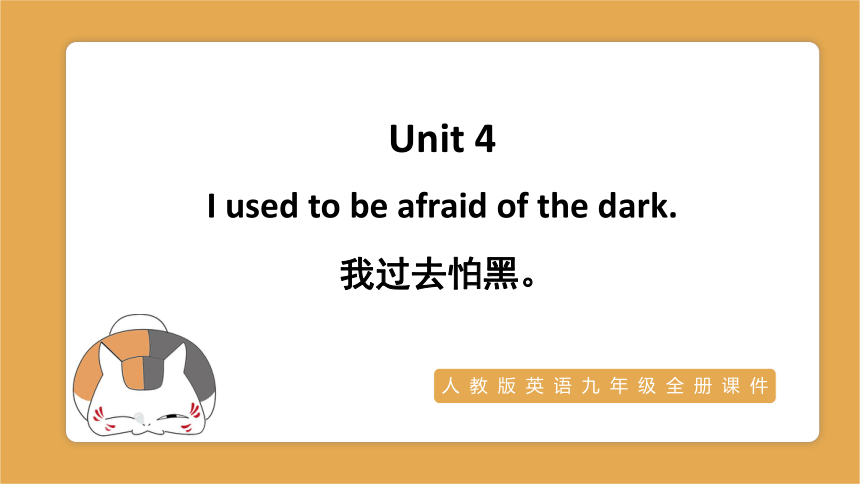 | |
| 格式 | pptx | ||
| 文件大小 | 2.4MB | ||
| 资源类型 | 教案 | ||
| 版本资源 | 人教新目标(Go for it)版 | ||
| 科目 | 英语 | ||
| 更新时间 | 2023-12-13 14:55:47 | ||
图片预览

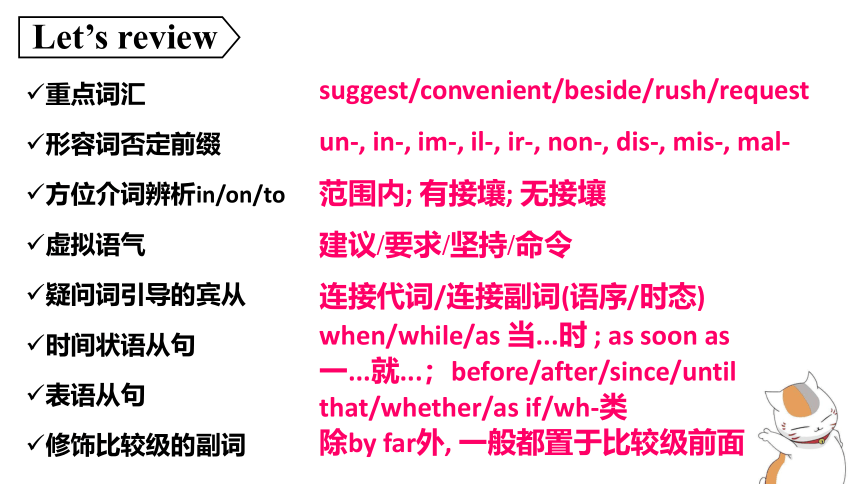
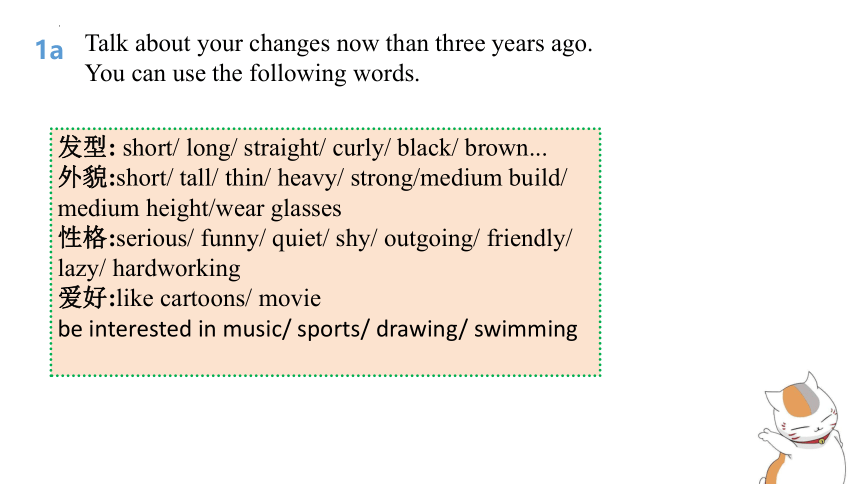
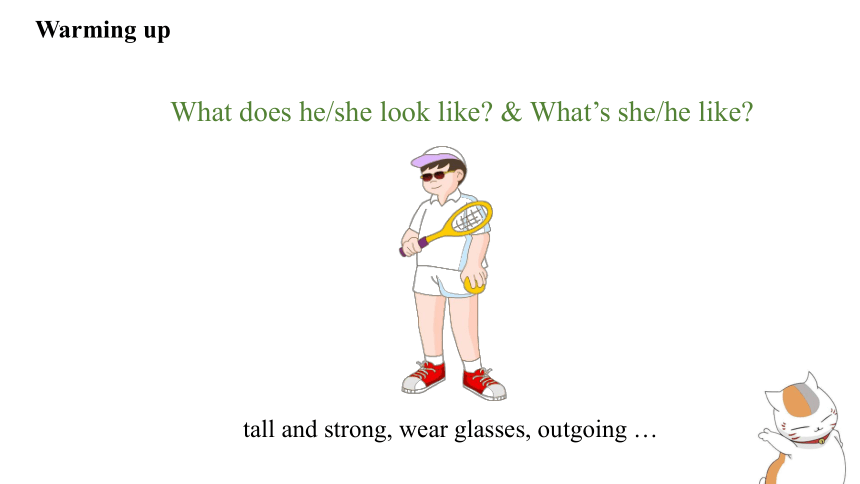
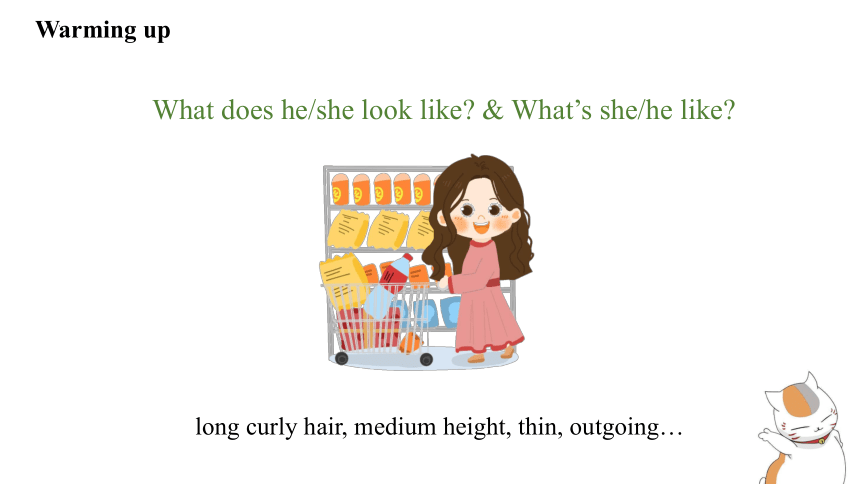
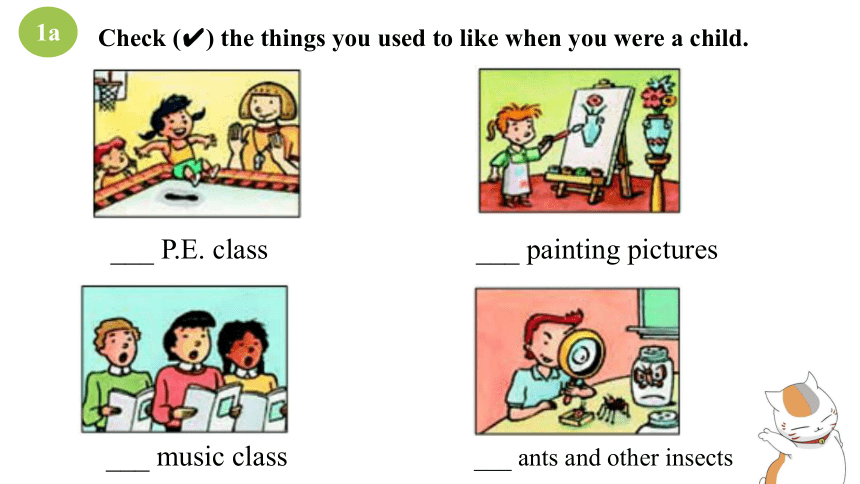
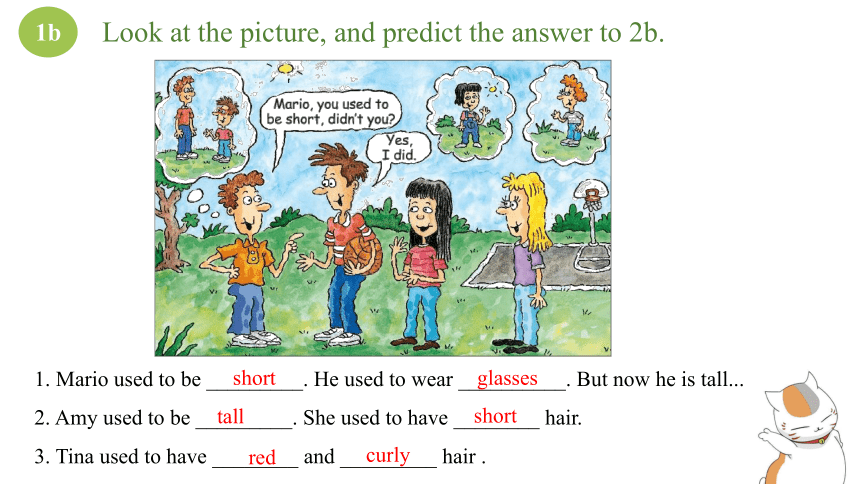
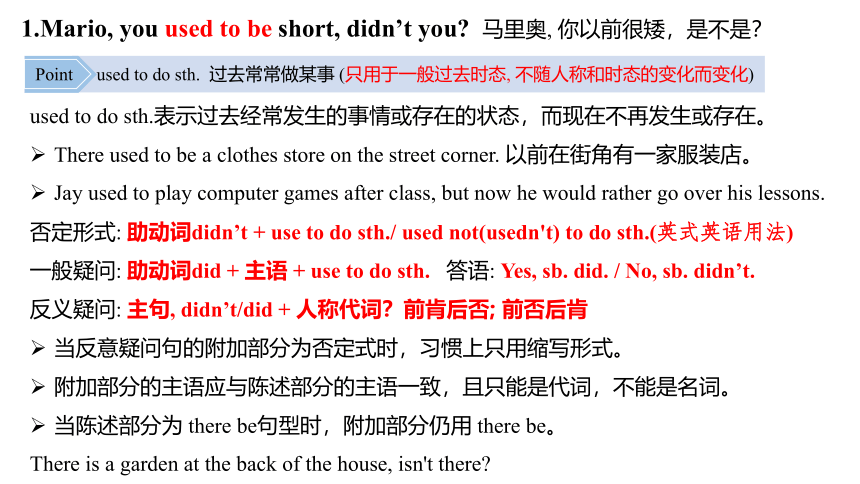
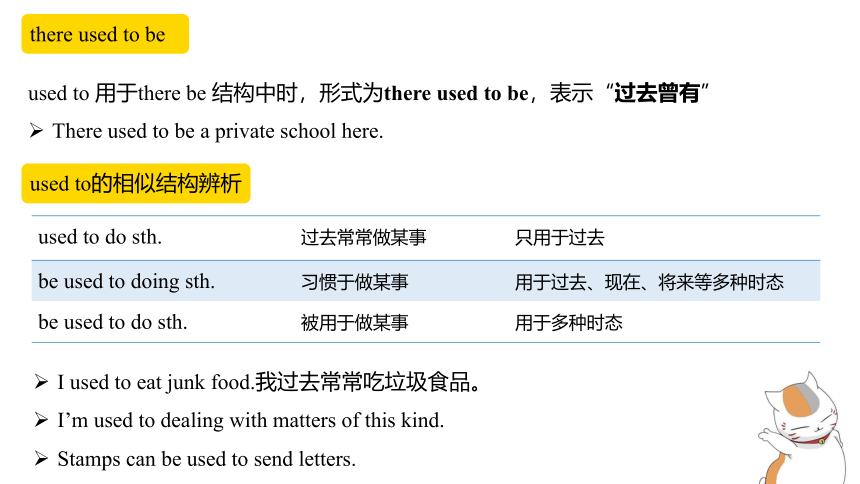
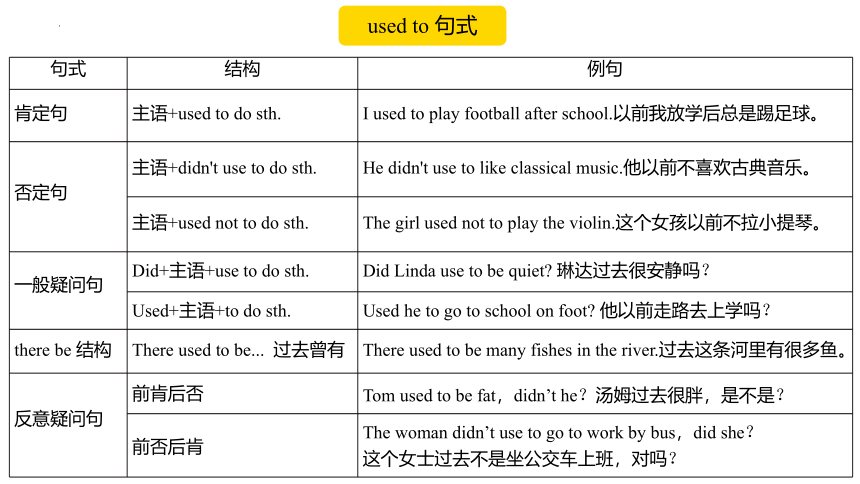
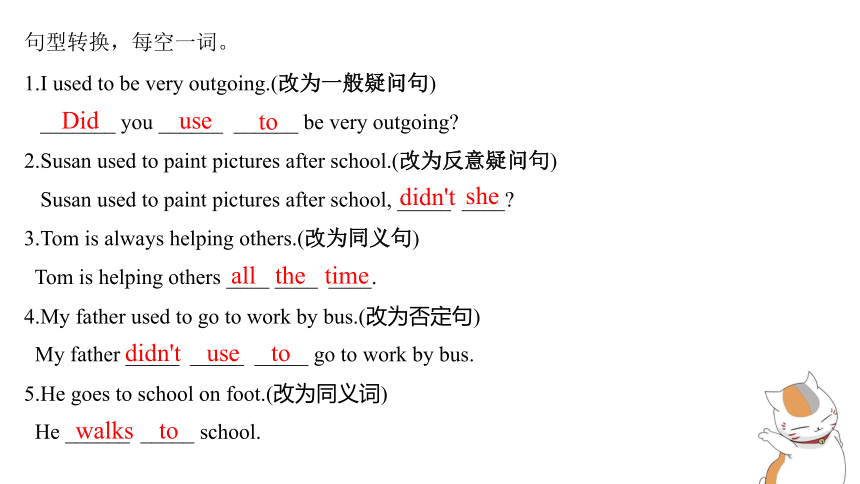
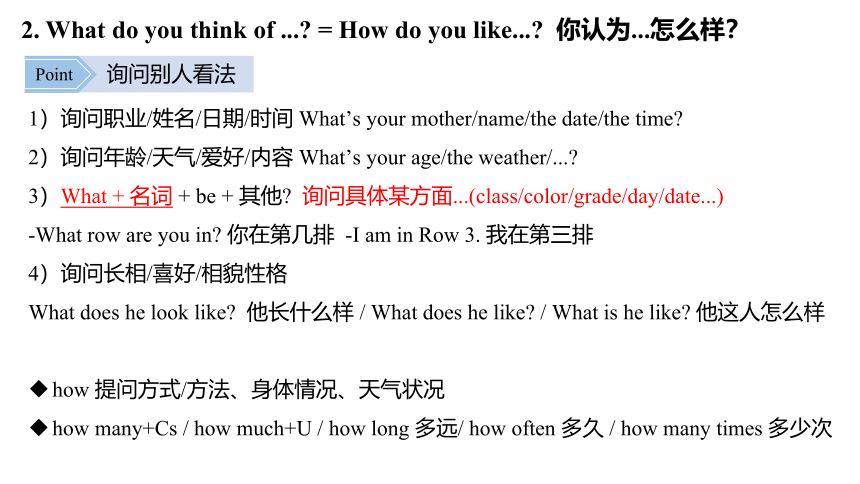
文档简介
(共46张PPT)
人教版英语九年级全册课件
Unit 4
I used to be afraid of the dark.
我过去怕黑。
重点词汇
形容词否定前缀
方位介词辨析in/on/to
虚拟语气
疑问词引导的宾从
时间状语从句
表语从句
修饰比较级的副词
suggest/convenient/beside/rush/request
un-, in-, im-, il-, ir-, non-, dis-, mis-, mal-
范围内; 有接壤; 无接壤
建议/要求/坚持/命令
连接代词/连接副词(语序/时态)
when/while/as 当...时 ; as soon as
一...就...;before/after/since/until
that/whether/as if/wh-类
除by far外, 一般都置于比较级前面
Let’s review
Talk about your changes now than three years ago. You can use the following words.
发型: short/ long/ straight/ curly/ black/ brown...
外貌:short/ tall/ thin/ heavy/ strong/medium build/ medium height/wear glasses
性格:serious/ funny/ quiet/ shy/ outgoing/ friendly/ lazy/ hardworking
爱好:like cartoons/ movie
be interested in music/ sports/ drawing/ swimming
1a
Warming up
What does he/she look like & What’s she/he like
tall and strong, wear glasses, outgoing …
Warming up
What does he/she look like & What’s she/he like
long curly hair, medium height, thin, outgoing…
___ P.E. class ___ painting pictures
Check ( ) the things you used to like when you were a child.
___ music class ___ ants and other insects
1a
1b
Look at the picture, and predict the answer to 2b.
1. Mario used to be _________. He used to wear __________. But now he is tall...
2. Amy used to be _________. She used to have ________ hair.
3. Tina used to have ________ and _________ hair .
short
glasses
tall
short
red
curly
used to do sth.表示过去经常发生的事情或存在的状态,而现在不再发生或存在。
There used to be a clothes store on the street corner. 以前在街角有一家服装店。
Jay used to play computer games after class, but now he would rather go over his lessons.
否定形式: 助动词didn’t + use to do sth./ used not(usedn't) to do sth.(英式英语用法)
一般疑问: 助动词did + 主语 + use to do sth. 答语: Yes, sb. did. / No, sb. didn’t.
反义疑问: 主句, didn’t/did + 人称代词?前肯后否; 前否后肯
当反意疑问句的附加部分为否定式时,习惯上只用缩写形式。
附加部分的主语应与陈述部分的主语一致,且只能是代词,不能是名词。
当陈述部分为 there be句型时,附加部分仍用 there be。
There is a garden at the back of the house, isn't there
1.Mario, you used to be short, didn’t you 马里奥, 你以前很矮,是不是?
used to do sth. 过去常常做某事 (只用于一般过去时态, 不随人称和时态的变化而变化)
Point
used to 用于there be 结构中时,形式为there used to be,表示“过去曾有”
There used to be a private school here.
used to do sth. 过去常常做某事 只用于过去
be used to doing sth. 习惯于做某事 用于过去、现在、将来等多种时态
be used to do sth. 被用于做某事 用于多种时态
I used to eat junk food.我过去常常吃垃圾食品。
I’m used to dealing with matters of this kind.
Stamps can be used to send letters.
there used to be
used to的相似结构辨析
used to 句式
句式 结构 例句
肯定句 主语+used to do sth. I used to play football after school.以前我放学后总是踢足球。
否定句 主语+didn't use to do sth. He didn't use to like classical music.他以前不喜欢古典音乐。
主语+used not to do sth. The girl used not to play the violin.这个女孩以前不拉小提琴。
一般疑问句 Did+主语+use to do sth. Did Linda use to be quiet 琳达过去很安静吗?
Used+主语+to do sth. Used he to go to school on foot 他以前走路去上学吗?
there be 结构 There used to be... 过去曾有 There used to be many fishes in the river.过去这条河里有很多鱼。
反意疑问句 前肯后否 Tom used to be fat,didn’t he?汤姆过去很胖,是不是?
前否后肯 The woman didn’t use to go to work by bus,did she?
这个女士过去不是坐公交车上班,对吗?
句型转换,每空一词。
1.I used to be very outgoing.(改为一般疑问句)
_______ you ______ ______ be very outgoing
2.Susan used to paint pictures after school.(改为反意疑问句)
Susan used to paint pictures after school, _____ ____
3.Tom is always helping others.(改为同义句)
Tom is helping others ____ ____ ____.
4.My father used to go to work by bus.(改为否定句)
My father _____ _____ _____ go to work by bus.
5.He goes to school on foot.(改为同义词)
He ______ _____ school.
Did
use
to
didn't
she
all the time
didn't use to
walks to
1)询问职业/姓名/日期/时间 What’s your mother/name/the date/the time
2)询问年龄/天气/爱好/内容 What’s your age/the weather/...
3)What + 名词 + be + 其他 询问具体某方面...(class/color/grade/day/date...)
-What row are you in 你在第几排 -I am in Row 3. 我在第三排
4)询问长相/喜好/相貌性格
What does he look like 他长什么样 / What does he like / What is he like 他这人怎么样
how 提问方式/方法、身体情况、天气状况
how many+Cs / how much+U / how long 多远/ how often 多久 / how many times 多少次
2. What do you think of ... = How do you like... 你认为...怎么样?
询问别人看法
Point
Read the following sentences and answer questions.
In the past now
1. Paula used to be really ___________. She was always silent in class. She wasn’t very_________. She was never brave enough to ask questions. 2. She got good grades in __________. She was also good in ____________. She used to play the ______________. 1. Now she’s more interested in
__________. She plays __________almost every day. She’s also on a _________team.
2. She still plays the
__________ from time to time.
Pre-listening
时常;有时
与at times和sometimes同义
Read the conversation.
2d
Alfred: This party is such a great idea!
Gina: I agree. It’s been three years since we last saw our primary school
classmates.
Alfred: It’s interesting to see how people have changed.
Gina: Billy has changed so much! He used to be so shy and quiet.
Alfred: Yeah, his face always turned red when he talked to girls!
Gina: I used to see him reading in the library every day. 看见某人正在做某事
Alfred: That’s because he was a really good student. He studied hard and got good scores on his exams.
Gina: Did he use to wear glasses
Alfred: Yes, and he used to be thin, too. But look how big and strong he is now!
Gina: He's so popular now. Look at all the girls around him!
score n.&v. (考试中的)分数,成绩; 得分;进球
1) 定义: 1. 过去发生或已经完成的动作对现在造成的影响或后果。
2. 从过去某一时间开始并一直持续到现在的动作或状态。
2) 基本结构: 主语 + have/has + done(过去分词)
3. It’s been three years since we last saw our primary school classmates.
现在完成时
Point
用法 例句
since+过去的一个时间点 I have been in Beijing since 2007.
自2007年起,我就一直在北京。
since+一段时间+ago The man has lived here since two years ago.
这个男人住在这里已经有两年了。
since+从句 (从句用一般过去时, 主句现在完成时) Our hometown has changed a lot since you left here.
自从你走以后,我们的家乡发生了很大的变化。
It is/ has been+一段时间+since从句. It has been nine years since we got to know each other.我们彼此相识已经有九年时间了。
1) 现在完成时表过去已经开始持续到现在的动作或状态, 一般为延续性动词 (注意, 如果是瞬间动词否定式, 一般可表一段时间的短语连用 I haven’t seen him for a long time.)
She has learned English for five years.
We have known each other since childhood.
2) 短暂性动词与延续性动词的转换
buy- have, become- be, borrow- keep, close/open- be closed/open, die- be dead, lose- be lost
marry- be married, come/arrive/reach/join- be in, begin- be on, get up- be up...
3) since 从某个时间开始算到说话为止, +过去时间点(具体年月/ago...) / 从句( 一般过去式)
for 持续了一段时间 +时间段
注意: 并非含for+一段时间都用现在完成时
I lived here for many years.我在这住过很多年 (现在不在了)
I have lived here for many years.我在这住过很多年 (现在还在)
含since/for的现在完成时
Exercises
3. My sister ______ be lazy. But now she’s working really hard.
A. used to B. is used to C. use to D. was used to
We used to ________ in the evening, but now we are used to ______ early in the morning.
A. exercise; exercise B. exercise; exercising
C. exercised; exercise D. exercising; exercise
A
B
Summary
Presentation
What was the girl like in the past
What kind of music does she like
What do you think the reading passage is about
3a
Look at the title of the passage, discuss the following questions.
From Shy Girl to Pop Star
For this month’s Young World magazine, I interviewed 19-year-old Asian pop star Candy Wang, Candy told me that she used to be really shy and took up singing to deal with her shyness. As she got better, she dared to sing in front of her class, and then for the whole school.Now she's not shy anymore and loves singing in front of crowds.
I asked Candy how life was different after she became famous. She explained that there are many good things, like being able to travel and meet new people all the time.“ I didn’t use to be popular in school, but now I get tons of attention everywhere I go.” However, too much attention can also be a bad thing. “I always have to worry about how I appear to others, and I have to be very careful about what I say or do. And I don’t have much private time anymore. Hanging out with friends is almost impossible for me now because there are always guards around me.”
What does Candy have to say to all those young people who want to become famous “Well,” she begins slowly, “you have to be prepared to give up your normal life. You can never imagine how difficult the road to success is. Many times I thought about giving up, but I fought on. You really require a lot of talent and hard work to succeed. Only a very small number of people make it to the top.”
From Shy Girl to Pop Star
prep. 比如
in front of: 强调在某一物体外部的前面
in the front of: 强调在某一物体内部的前面
appear=look/seem v.看上去;出现;呈现;出版;演出;提及记载
appear to do.好像;似乎;看来
Structure
From Shy Girl to Pop Star
Candy’s background
(Para. 1)
①19-year-old Asian pop star
②used to: shy; took up singing to deal with her shyness
③now: not shy; loves singing in front of crowds
How Candy’s life has changed(Para. 2)
Get tons of attention
(bad things)
① used to: wasn’t popular in school
② now: be able to travel and meet new people(good things);
a. worries about how to appear to others
b. has to be careful about what to say or do
c. doesn’t have much private time
Candy’s advice for young people
(Para. 3)
①be prepared to give up your normal life
②should fight on
③require a lot of talent and hard work
④a very small number of people make it to the top
1.Candy told me that she used to be really shy and took up singing to deal with her shyness. 坎迪告诉我她过去非常害羞,于是开始唱歌来对付她的羞怯。
take up 意为“开始做”,通常指开始某项工作/某个爱好等。尤指以前从未做过的事。
He is going to take up a hobby like painting.
take up doing sth.意为“开始做某事”。My father took up learning English at the age of forty.
【take相关短语】
take in 吸收;领会;理解;欺骗;接待
take out 取出; 去掉; 倒掉; 发泄
take over 接管; 接收
take down 记下; 拆除
take away 拿走
take after 长得像; 与...相像; 效仿;追赶
take up 拿起;从事;接纳(乘客)/接受;占用(时间/空间);继续做;担任;募捐
Point
dare/ de / ,/der/ v.敢于;胆敢
Point
2. As she got better, she dared to sing in front of her class.
1)dare在此作实义动词,有时态、数等的变化,一般不用于进行时。
dare to do sth.意为“敢于做某事”。
The little girl doesn’t dare to ask questions.
2)dare还可作情态动词,后接动词原形,常用于否定句或疑问句。
I daren’t speak in public. 我不敢当中演讲。
Dare she go out alone at night 她敢在晚上一个人外出吗?
1) 随着.../一边...一边... 表示某事一发生,另一事随即发生
As the sun rose, the fog disappeared. 太阳一出来雾就散了。
2) 当...的时候 表示某事发生的过程中另一事发生
I heard the murmur of their voices as I acrossed the hall.
我走过大厅的时候听到他们在嘀咕什么。
3) 当...的时候 表示两个动作同时发生
He smiled as he passed. 他路过的时候笑了一下
【as、when当...时+时间点/段,多用于一般时 、while当...时+时间段, 多用于进行时】
when可与延续性动词/短暂性动词连用, while和as只能和延续性动词连用。
when从句的谓语动词可在主句动作之前/之后/同时, while和as必须是同时发生。
当从句动作时间概念淡化, 主要表示主句动作发生的背景/条件时, 只能用as。
He was working at the table when I went in.
They rushed in while we were discussing problems.
as引导的时间状语从句
3. Hanging out with friends is almost impossible for me now because there are always guards around me.
现在对于我来说和朋友们一起闲逛几乎是不可能的,因为在我的周围总是有警卫。
hang v.悬挂/吊;垂落;悬浮;绞刑 n.下垂
get the hang of sth. 掌握…的要领/找到...的诀窍
It's not difficult once you get the hang of it. 你掌握了要领就不难了。
hang out 闲逛;闲荡 =hang around=hang about Where does he hang out these days
hang up 挂断电话
hang on 抓紧;等一下;别挂电话;(在逆境中)坚持, 不放弃
hang on sth.有赖于,取决于(某事物)=depend on
hang on to sth. 抓紧某物;保留;不卖掉;不放弃 Let's hang on to those old photos.
hang back 留下; 继续留在原处
动名词/不定式/主语从句置于句首, 谓语动词单数
4. . . .you have to be prepared to give up your normal life.
你必须准备好放弃你的正常生活。
be prepared to do sth. 准备好做某事,愿意做某事
I am prepared to take the exam.
be prepared for sth. 为……做好准备
give up sth. 放弃; 耗费, 后接代词作宾语时,应将代词放在give 和 up之间。
We should never give up hope.
English is very important. Don’t give it up.
I will never give up doing sports because I hope I will be healthier.
【give相关短语】
give in (to) 向...屈服; 让步 give and take 互相让步/迁就
give out 分发; 用完; 耗尽; 停止运转 give away 分/颁发;捐赠; 泄露
give off 散发(气味); 发出(热/光); 长出(枝/杈); 公布/宣布
require/r kwa (r)/ v.需要;要求 (通常不用于进行时)
Point
5. You really require a lot of talent and hard work to succeed.
6. Only a very small number of people make it to the top. 只有极少人才能出人头地。
Only adv.只有;仅仅;直到 (置于句首的用法)
1. 限制主语时,起强调作用 (正常语序) Only five people turned up. 只来了五个人。
2. 修饰状语时(介词短语in this way/副词then/状语从句when)要半倒装
Only then did she realize the stress he was under. 直到那时她才意识到他所承受的压力。
结果状语:only to do sth.不料; 竟然(意外/不幸) only doing sth. 结果是(自然/意料之中)
a number of + 可数名词复数, 许多... (some/many/lots of), 谓语动词复数
the number of + 可数名词复数 , ...的数量, 谓语动词单数
A large number of students are ill these days because of the flu.
The number of the students in our class is 53. 我们班有53人。
make it 获得成功; (尤指在困难情况下)准时到达; 出席/到场; 幸免于难/渡过难关
The flight leaves in twenty minutes─we'll never make it. ..., 我们无论如何也赶不上了。
I don't know how I made it through the week. 我不知道自己是怎么熬过那个星期的。
一、根据首字母提示补全单词。
1. The boy d____ to talk back (顶嘴) in class. The teacher is very angry.
2. The young man isn't a boss. He is only a g_____. Look!He is standing at the gate.
3. Can you imagine how difficult the road to s______ is So you must work hard to succeed.
4. If you are p_______ to give up your good job, you can go with me.
5. Many movie stars are so busy that they don’t have their p_______ time.
6. Are you brave enough to give a _________ (speak) in front of the whole school
ares
uard
uccess
repared
Exercise
rivate
speech
二、选择方框中的短语,用其正确形式填空。
take up think about hang out deal with not ... anymore
1. Mo Yan ________ writing for many years. He is very famous in the field.
2. Maybe nobody _________ in the city because the city is polluted badly.
3. He will _________ the problem by himself.
4. The monkey _________appear to us ________. 出现
5. I'm ____________ giving up my good life and will have a hard life.
takes up
deal with
anymore
thinking about
hangs out
didn't
1. Grace often gets nervous before she gives a speech _________.
A. in public B. in total
C. in common 共同; 共有 D. in general
have sth in common (with sth) 有许多相同之处 in common with sb/sth 与…相同
2. It took me almost a whole day to _______ so many emails. =in the same way as ...
A. deal with B. cut in 发动/启动(马达或发动机); 插嘴; 抢车道
C. cheer on 为...喝彩/欢呼 D. run out 用完;耗尽;过期/失效(协议/文件)
3. My grandmother is going to _______ a hobby like shopping on the Internet.
A. get up 起来; 猛烈(海浪;风) B. use up 用尽;吃光 C. look up D. take up
4. Diana used to ______ to work, but now she is used to _____ because the road
is crowded and she wants to keep fit.
A. drive; walking B. drive; walk C. driving; walk D. driving; walking
A
A
三、单选
D
A
While-reading
Read the passage again and underline the problems that Li Wen used to have.
Scanning
Li Wen is a normal 15-year-old boy from the countryside. He works very hard and does well in school. It is hard to believe that he used to have difficulties in school. When he was a little boy, he seldom caused any problems, and his family spent a lot of time together. However, things began to change a few years ago. His parents moved to the city to look for jobs, and his grandparents came to take care of him. But he missed his parents so much and he often felt lonely and unhappy.
2c
成功; 做得好;进展得好
have problem/difficulty/trouble + (in) doing sth./with sth. (在/做)...有困难
Underline the problems that Li Wen used to have.
Scanning
Li Wen’s unhappiness began to influence his schoolwork. He became less interested in studying. Sometimes he was absent from classes and failed his examinations. Finally, Li Wen’s parents made the decision to send him to a boarding school.
2c
However, Li Wen was shy and not able to make friends quickly in school. He found life there difficult. One day he told his teacher that he wanted to leave the school. His teacher was worried about him and she called his parents. She advised them to talk with their son in person. So his parents took a 24-hour train and a 5-hour bus ride to get to Li Wen’s school.
They had a long talk. “It was exactly what I needed,” he said. “Now I understand that even though they are busy, they are always thinking of me. They take pride in everything good that I do.” 定语从句
亲身;亲自
v.&n. 影响
表语从句,what作宾语成分
Scanning
After that, Li Wen ’s parents had much more communication with their son than they used to. Now Li Wen has really changed. He has become more outgoing and made some good friends in school. He has even joined the school basketball team and become active in many other activities. “I’m much happier now, and I work even harder than I used to. I know my parents love me and they’re always proud of me,” says Li Wen .“It’s very important for parents to be there for their children”.
2c
Underline what Li Wen is like now.
be active in sth. 积极参加...
be there for sb. 在某人身边(随时提供帮助)
Post-reading
He Studies Harder Than He Used to
介绍李文及其变化(Para.1)
李文过去的表现及其父母的做法(Para.2-4)
Li Wen: a normal 15-year-old boy; works hard;
does well in school
李文现在的表现(Para.5)
Used to: have difficulties in school
Reason: ①his parents moved to the city;
②he missed his parents and felt lonely and unhappy
① became less interested in studying ②was absent from classes and failed his examinations
sent him to a boarding school
① was not able to make friends quickly ② wanted to leave the school
①got to his school
②had a long talk
①has become more outgoing and made some good friends
②has joined the school basketball team and become active
③much happier, works harder
Li Wen is a 15-year-old boy. He works hard and does well in school. It is hard to believe that he used to have difficulties in school. When his parents moved to the city to work, they could not be at home to ___________________ him. So he became less interested in studying and ______________________ classes.
Then his parents ______________________ to send him to a boarding school. He found life there difficult. One day he told his teacher he wanted to leave the school. His teacher advised his parents to talk with their son in person. This conversation _________________ his life. He realized that his parents would always love him, and they would _____________________ everything good that he did. Now he is much happier and more outgoing than he used to be.
be proud of/take pride in make a decision/decide
miss/be absent from change/influence look after/take care of
look after / take care of
missed / was absent from
Complete the passage with the proper forms of the words and phrases.
made a decision / decided
changed / influenced
be proud of / take pride in
adv.不常; 很少
Point
1. When he was a little boy, he seldom caused any problems, and his family spent a lot of time together.
1)常置于实义动词前, be/情态动词/助动词后, 表否定意义
He seldom goes out. 他很少外出。
2)在反意疑问句中, 作否定词, 后面的附加疑问句用肯定形式。
He seldom hangs out, does he 他很少闲逛, 是吗?
3)频率副词常与一般现在时连用
always总是,一直> uaually通常 >often经常 >sometimes有时 >seldom很少 >never从不
walk to school
walk to school 意为“步行上学”,相当于go to school on foot 。
【拓展】
ride(a bike) to school=go to school by bike
drive(a car) to work=go to work by car
fly to Beijing=go to Beijing by plane
advise / d va z/ v.建议; 通知/正式告知 ~ sb. of sth.
advise sb.to do sth. 建议某人做某事
suggest doing sth. 建议做某事
advise sb.against (doing) sth.建议某人不要做某事
advice [U]建议 a piece of advice 一条建议 some advice 一些建议
suggestion [C]建议 some suggestions 一些建议
worry about/over... 担心, 担忧(尤指在持续的一段时间内), 后常跟名词、代词或动名词、从句,接从句时要省略介词。
no worries! 没什么,不客气,没关系
hate v.&n. 憎恶,憎恨;厌恶,不喜欢; 不愿,不想
hate sth/hate doing sth. 厌恶某物/ 讨厌做某事
I hate spinach. 我讨厌菠菜。She hates making mistakes.她讨厌出错。
hate to do sth. 不想/不愿...
I hate to trouble you, but could I use your phone 我不愿麻烦你,但我能用一下你的电话吗?
all the time
all the time 意为“一直,始终”,表示在某一段时间内一直进行或发生的动作,常置于句末。相当于always/sometimes
at a time 每次;逐一;依次 at one time 曾经;一度 at all times = always 总是;随时;永远
关系代词:which物/that人或物/who/whom/ whose人或物 =of which/whom (作定语)
关系副词:where/when/why=for which (状语, 关系副词=适当介词+which)
定义:在复合句中修饰某个名词/代词的句子。(被修饰的名词叫先行词)
Take the book which/that is lying on the table. (作主语)
He is one of the boys who like playing baseball. (作主语)
I have the relatives and friends whom I love. (作宾语)
I will never forget the mountain where/in which I lived. (作地点状语)
I remember the day when/on which I graduated from my middle school. (作时间状语)
It reminds me of the good old days that/which I spent in my hometown. (作宾语)
Do you know the reason why/for which he disappeared (作原因状语)
The people with whom he worked thought he was a bit strange. (作宾语)
定语从句
关系词
可作主语/宾语(可省略)
【时态】因其用来修饰名词或代词, 所以其时间点可和主句脱钩, 时态自由程度较大
I’m reading the book that you bought yesterday. 我正在看你昨天买的书。
I will read the book that you mentioned yesterday. 我会读你昨天提到的那本书的。
I visited the country where he will go to next Friday. 我去过了他下周五要去的那个国家。
【主谓一致】
1. 当关系词在从句中作主语时, 从句谓语动词要与先行词保持一致。
He is one of the boys who like playing baseball. (作主语)
2. one of + 复数名词作先行词时, 谓语动词用复数; 被the only/the very等限定词修饰时, 单数
He is one of the three students who have passed the exam. 他是三名通过考试的学生之一。
He is the only one of the three students who has passed the exam. 他是唯一通过考试的学生。
注意:one of + 复数名词 做主语,谓语动词用单数 One of the apples has gone bad.
【指物时只用that的情况】
1. 先行词本身就是或是被序数词/形容词最高级修饰时。
This is the longest bridge that I have ever seen. 这是我看到过的最长的桥。
We will never forget those happiest days that we spent with them last year.
2. 先行词是不定代词时。(all/little/much/anything/somthing...)
Is there anything that you don’t need 没有你们不需要的东西吗?
3. 先行词被all/every/no/some/any/little/much等不定代词修饰时。
I want to watch all the movies that acted by Zhou Xingchi.
4. 先行词被the only/the very/the same/the last修饰时。
Here is the very bag that you lost yesterday. 这是你昨天丢的那个包。
5. 先行词既指人又指物时。
They talked about the persons and the book that interested them.
6. 主句是以who/which开始的特殊疑问句。Which is the hotel that you like best
【指物时只用which的情况】
1. 关系词前有介词。
China has hundreds of islands, of which Taiwan is the largest one.
2. 先行词本身是that/those时。
What’s that which flashed in the sky just now 刚才天空中一闪而过的是什么?
3. 一个句子中有两个定语从句时, 一个用that, 一个用which。
Let me show you the novel that I borrowed from the library which was newly open.
4. 引导非限制性定语从句 (who/whom/whose /which/as /when/where/for which)
There has just been a heavy rain, which makes the farmers delighted.
限制性定语从句: 先行词是不可缺少的部分, 去掉之后,主句意思不明确,不能用逗号隔开。
非限制性定从: 对先行词的附加说明, 去掉之后,主句意思明确,从句与主句间常用逗号隔开。
The house, which was bulit fifty years ago, stood in the earthquake.
【只用who的情况】
1. there be结构中, 先行词是人时。
There is a young man who wants to see you. 有一个年轻人想见你。
2.先行词是I/you/he/they时。(常用于谚语中)
He who plays with fire gets burned. 玩火自焚。
3. 一个句子中有两个定语从句时, 为避免重复或歧义, 一个用that, 一个用who。
The man that spoke at the meeting is our new headmaster who has just come from HK.
那个在会上讲话的人是我们的新校长, 他来自香港。
Summary
人教版英语九年级全册课件
Unit 4
I used to be afraid of the dark.
我过去怕黑。
重点词汇
形容词否定前缀
方位介词辨析in/on/to
虚拟语气
疑问词引导的宾从
时间状语从句
表语从句
修饰比较级的副词
suggest/convenient/beside/rush/request
un-, in-, im-, il-, ir-, non-, dis-, mis-, mal-
范围内; 有接壤; 无接壤
建议/要求/坚持/命令
连接代词/连接副词(语序/时态)
when/while/as 当...时 ; as soon as
一...就...;before/after/since/until
that/whether/as if/wh-类
除by far外, 一般都置于比较级前面
Let’s review
Talk about your changes now than three years ago. You can use the following words.
发型: short/ long/ straight/ curly/ black/ brown...
外貌:short/ tall/ thin/ heavy/ strong/medium build/ medium height/wear glasses
性格:serious/ funny/ quiet/ shy/ outgoing/ friendly/ lazy/ hardworking
爱好:like cartoons/ movie
be interested in music/ sports/ drawing/ swimming
1a
Warming up
What does he/she look like & What’s she/he like
tall and strong, wear glasses, outgoing …
Warming up
What does he/she look like & What’s she/he like
long curly hair, medium height, thin, outgoing…
___ P.E. class ___ painting pictures
Check ( ) the things you used to like when you were a child.
___ music class ___ ants and other insects
1a
1b
Look at the picture, and predict the answer to 2b.
1. Mario used to be _________. He used to wear __________. But now he is tall...
2. Amy used to be _________. She used to have ________ hair.
3. Tina used to have ________ and _________ hair .
short
glasses
tall
short
red
curly
used to do sth.表示过去经常发生的事情或存在的状态,而现在不再发生或存在。
There used to be a clothes store on the street corner. 以前在街角有一家服装店。
Jay used to play computer games after class, but now he would rather go over his lessons.
否定形式: 助动词didn’t + use to do sth./ used not(usedn't) to do sth.(英式英语用法)
一般疑问: 助动词did + 主语 + use to do sth. 答语: Yes, sb. did. / No, sb. didn’t.
反义疑问: 主句, didn’t/did + 人称代词?前肯后否; 前否后肯
当反意疑问句的附加部分为否定式时,习惯上只用缩写形式。
附加部分的主语应与陈述部分的主语一致,且只能是代词,不能是名词。
当陈述部分为 there be句型时,附加部分仍用 there be。
There is a garden at the back of the house, isn't there
1.Mario, you used to be short, didn’t you 马里奥, 你以前很矮,是不是?
used to do sth. 过去常常做某事 (只用于一般过去时态, 不随人称和时态的变化而变化)
Point
used to 用于there be 结构中时,形式为there used to be,表示“过去曾有”
There used to be a private school here.
used to do sth. 过去常常做某事 只用于过去
be used to doing sth. 习惯于做某事 用于过去、现在、将来等多种时态
be used to do sth. 被用于做某事 用于多种时态
I used to eat junk food.我过去常常吃垃圾食品。
I’m used to dealing with matters of this kind.
Stamps can be used to send letters.
there used to be
used to的相似结构辨析
used to 句式
句式 结构 例句
肯定句 主语+used to do sth. I used to play football after school.以前我放学后总是踢足球。
否定句 主语+didn't use to do sth. He didn't use to like classical music.他以前不喜欢古典音乐。
主语+used not to do sth. The girl used not to play the violin.这个女孩以前不拉小提琴。
一般疑问句 Did+主语+use to do sth. Did Linda use to be quiet 琳达过去很安静吗?
Used+主语+to do sth. Used he to go to school on foot 他以前走路去上学吗?
there be 结构 There used to be... 过去曾有 There used to be many fishes in the river.过去这条河里有很多鱼。
反意疑问句 前肯后否 Tom used to be fat,didn’t he?汤姆过去很胖,是不是?
前否后肯 The woman didn’t use to go to work by bus,did she?
这个女士过去不是坐公交车上班,对吗?
句型转换,每空一词。
1.I used to be very outgoing.(改为一般疑问句)
_______ you ______ ______ be very outgoing
2.Susan used to paint pictures after school.(改为反意疑问句)
Susan used to paint pictures after school, _____ ____
3.Tom is always helping others.(改为同义句)
Tom is helping others ____ ____ ____.
4.My father used to go to work by bus.(改为否定句)
My father _____ _____ _____ go to work by bus.
5.He goes to school on foot.(改为同义词)
He ______ _____ school.
Did
use
to
didn't
she
all the time
didn't use to
walks to
1)询问职业/姓名/日期/时间 What’s your mother/name/the date/the time
2)询问年龄/天气/爱好/内容 What’s your age/the weather/...
3)What + 名词 + be + 其他 询问具体某方面...(class/color/grade/day/date...)
-What row are you in 你在第几排 -I am in Row 3. 我在第三排
4)询问长相/喜好/相貌性格
What does he look like 他长什么样 / What does he like / What is he like 他这人怎么样
how 提问方式/方法、身体情况、天气状况
how many+Cs / how much+U / how long 多远/ how often 多久 / how many times 多少次
2. What do you think of ... = How do you like... 你认为...怎么样?
询问别人看法
Point
Read the following sentences and answer questions.
In the past now
1. Paula used to be really ___________. She was always silent in class. She wasn’t very_________. She was never brave enough to ask questions. 2. She got good grades in __________. She was also good in ____________. She used to play the ______________. 1. Now she’s more interested in
__________. She plays __________almost every day. She’s also on a _________team.
2. She still plays the
__________ from time to time.
Pre-listening
时常;有时
与at times和sometimes同义
Read the conversation.
2d
Alfred: This party is such a great idea!
Gina: I agree. It’s been three years since we last saw our primary school
classmates.
Alfred: It’s interesting to see how people have changed.
Gina: Billy has changed so much! He used to be so shy and quiet.
Alfred: Yeah, his face always turned red when he talked to girls!
Gina: I used to see him reading in the library every day. 看见某人正在做某事
Alfred: That’s because he was a really good student. He studied hard and got good scores on his exams.
Gina: Did he use to wear glasses
Alfred: Yes, and he used to be thin, too. But look how big and strong he is now!
Gina: He's so popular now. Look at all the girls around him!
score n.&v. (考试中的)分数,成绩; 得分;进球
1) 定义: 1. 过去发生或已经完成的动作对现在造成的影响或后果。
2. 从过去某一时间开始并一直持续到现在的动作或状态。
2) 基本结构: 主语 + have/has + done(过去分词)
3. It’s been three years since we last saw our primary school classmates.
现在完成时
Point
用法 例句
since+过去的一个时间点 I have been in Beijing since 2007.
自2007年起,我就一直在北京。
since+一段时间+ago The man has lived here since two years ago.
这个男人住在这里已经有两年了。
since+从句 (从句用一般过去时, 主句现在完成时) Our hometown has changed a lot since you left here.
自从你走以后,我们的家乡发生了很大的变化。
It is/ has been+一段时间+since从句. It has been nine years since we got to know each other.我们彼此相识已经有九年时间了。
1) 现在完成时表过去已经开始持续到现在的动作或状态, 一般为延续性动词 (注意, 如果是瞬间动词否定式, 一般可表一段时间的短语连用 I haven’t seen him for a long time.)
She has learned English for five years.
We have known each other since childhood.
2) 短暂性动词与延续性动词的转换
buy- have, become- be, borrow- keep, close/open- be closed/open, die- be dead, lose- be lost
marry- be married, come/arrive/reach/join- be in, begin- be on, get up- be up...
3) since 从某个时间开始算到说话为止, +过去时间点(具体年月/ago...) / 从句( 一般过去式)
for 持续了一段时间 +时间段
注意: 并非含for+一段时间都用现在完成时
I lived here for many years.我在这住过很多年 (现在不在了)
I have lived here for many years.我在这住过很多年 (现在还在)
含since/for的现在完成时
Exercises
3. My sister ______ be lazy. But now she’s working really hard.
A. used to B. is used to C. use to D. was used to
We used to ________ in the evening, but now we are used to ______ early in the morning.
A. exercise; exercise B. exercise; exercising
C. exercised; exercise D. exercising; exercise
A
B
Summary
Presentation
What was the girl like in the past
What kind of music does she like
What do you think the reading passage is about
3a
Look at the title of the passage, discuss the following questions.
From Shy Girl to Pop Star
For this month’s Young World magazine, I interviewed 19-year-old Asian pop star Candy Wang, Candy told me that she used to be really shy and took up singing to deal with her shyness. As she got better, she dared to sing in front of her class, and then for the whole school.Now she's not shy anymore and loves singing in front of crowds.
I asked Candy how life was different after she became famous. She explained that there are many good things, like being able to travel and meet new people all the time.“ I didn’t use to be popular in school, but now I get tons of attention everywhere I go.” However, too much attention can also be a bad thing. “I always have to worry about how I appear to others, and I have to be very careful about what I say or do. And I don’t have much private time anymore. Hanging out with friends is almost impossible for me now because there are always guards around me.”
What does Candy have to say to all those young people who want to become famous “Well,” she begins slowly, “you have to be prepared to give up your normal life. You can never imagine how difficult the road to success is. Many times I thought about giving up, but I fought on. You really require a lot of talent and hard work to succeed. Only a very small number of people make it to the top.”
From Shy Girl to Pop Star
prep. 比如
in front of: 强调在某一物体外部的前面
in the front of: 强调在某一物体内部的前面
appear=look/seem v.看上去;出现;呈现;出版;演出;提及记载
appear to do.好像;似乎;看来
Structure
From Shy Girl to Pop Star
Candy’s background
(Para. 1)
①19-year-old Asian pop star
②used to: shy; took up singing to deal with her shyness
③now: not shy; loves singing in front of crowds
How Candy’s life has changed(Para. 2)
Get tons of attention
(bad things)
① used to: wasn’t popular in school
② now: be able to travel and meet new people(good things);
a. worries about how to appear to others
b. has to be careful about what to say or do
c. doesn’t have much private time
Candy’s advice for young people
(Para. 3)
①be prepared to give up your normal life
②should fight on
③require a lot of talent and hard work
④a very small number of people make it to the top
1.Candy told me that she used to be really shy and took up singing to deal with her shyness. 坎迪告诉我她过去非常害羞,于是开始唱歌来对付她的羞怯。
take up 意为“开始做”,通常指开始某项工作/某个爱好等。尤指以前从未做过的事。
He is going to take up a hobby like painting.
take up doing sth.意为“开始做某事”。My father took up learning English at the age of forty.
【take相关短语】
take in 吸收;领会;理解;欺骗;接待
take out 取出; 去掉; 倒掉; 发泄
take over 接管; 接收
take down 记下; 拆除
take away 拿走
take after 长得像; 与...相像; 效仿;追赶
take up 拿起;从事;接纳(乘客)/接受;占用(时间/空间);继续做;担任;募捐
Point
dare/ de / ,/der/ v.敢于;胆敢
Point
2. As she got better, she dared to sing in front of her class.
1)dare在此作实义动词,有时态、数等的变化,一般不用于进行时。
dare to do sth.意为“敢于做某事”。
The little girl doesn’t dare to ask questions.
2)dare还可作情态动词,后接动词原形,常用于否定句或疑问句。
I daren’t speak in public. 我不敢当中演讲。
Dare she go out alone at night 她敢在晚上一个人外出吗?
1) 随着.../一边...一边... 表示某事一发生,另一事随即发生
As the sun rose, the fog disappeared. 太阳一出来雾就散了。
2) 当...的时候 表示某事发生的过程中另一事发生
I heard the murmur of their voices as I acrossed the hall.
我走过大厅的时候听到他们在嘀咕什么。
3) 当...的时候 表示两个动作同时发生
He smiled as he passed. 他路过的时候笑了一下
【as、when当...时+时间点/段,多用于一般时 、while当...时+时间段, 多用于进行时】
when可与延续性动词/短暂性动词连用, while和as只能和延续性动词连用。
when从句的谓语动词可在主句动作之前/之后/同时, while和as必须是同时发生。
当从句动作时间概念淡化, 主要表示主句动作发生的背景/条件时, 只能用as。
He was working at the table when I went in.
They rushed in while we were discussing problems.
as引导的时间状语从句
3. Hanging out with friends is almost impossible for me now because there are always guards around me.
现在对于我来说和朋友们一起闲逛几乎是不可能的,因为在我的周围总是有警卫。
hang v.悬挂/吊;垂落;悬浮;绞刑 n.下垂
get the hang of sth. 掌握…的要领/找到...的诀窍
It's not difficult once you get the hang of it. 你掌握了要领就不难了。
hang out 闲逛;闲荡 =hang around=hang about Where does he hang out these days
hang up 挂断电话
hang on 抓紧;等一下;别挂电话;(在逆境中)坚持, 不放弃
hang on sth.有赖于,取决于(某事物)=depend on
hang on to sth. 抓紧某物;保留;不卖掉;不放弃 Let's hang on to those old photos.
hang back 留下; 继续留在原处
动名词/不定式/主语从句置于句首, 谓语动词单数
4. . . .you have to be prepared to give up your normal life.
你必须准备好放弃你的正常生活。
be prepared to do sth. 准备好做某事,愿意做某事
I am prepared to take the exam.
be prepared for sth. 为……做好准备
give up sth. 放弃; 耗费, 后接代词作宾语时,应将代词放在give 和 up之间。
We should never give up hope.
English is very important. Don’t give it up.
I will never give up doing sports because I hope I will be healthier.
【give相关短语】
give in (to) 向...屈服; 让步 give and take 互相让步/迁就
give out 分发; 用完; 耗尽; 停止运转 give away 分/颁发;捐赠; 泄露
give off 散发(气味); 发出(热/光); 长出(枝/杈); 公布/宣布
require/r kwa (r)/ v.需要;要求 (通常不用于进行时)
Point
5. You really require a lot of talent and hard work to succeed.
6. Only a very small number of people make it to the top. 只有极少人才能出人头地。
Only adv.只有;仅仅;直到 (置于句首的用法)
1. 限制主语时,起强调作用 (正常语序) Only five people turned up. 只来了五个人。
2. 修饰状语时(介词短语in this way/副词then/状语从句when)要半倒装
Only then did she realize the stress he was under. 直到那时她才意识到他所承受的压力。
结果状语:only to do sth.不料; 竟然(意外/不幸) only doing sth. 结果是(自然/意料之中)
a number of + 可数名词复数, 许多... (some/many/lots of), 谓语动词复数
the number of + 可数名词复数 , ...的数量, 谓语动词单数
A large number of students are ill these days because of the flu.
The number of the students in our class is 53. 我们班有53人。
make it 获得成功; (尤指在困难情况下)准时到达; 出席/到场; 幸免于难/渡过难关
The flight leaves in twenty minutes─we'll never make it. ..., 我们无论如何也赶不上了。
I don't know how I made it through the week. 我不知道自己是怎么熬过那个星期的。
一、根据首字母提示补全单词。
1. The boy d____ to talk back (顶嘴) in class. The teacher is very angry.
2. The young man isn't a boss. He is only a g_____. Look!He is standing at the gate.
3. Can you imagine how difficult the road to s______ is So you must work hard to succeed.
4. If you are p_______ to give up your good job, you can go with me.
5. Many movie stars are so busy that they don’t have their p_______ time.
6. Are you brave enough to give a _________ (speak) in front of the whole school
ares
uard
uccess
repared
Exercise
rivate
speech
二、选择方框中的短语,用其正确形式填空。
take up think about hang out deal with not ... anymore
1. Mo Yan ________ writing for many years. He is very famous in the field.
2. Maybe nobody _________ in the city because the city is polluted badly.
3. He will _________ the problem by himself.
4. The monkey _________appear to us ________. 出现
5. I'm ____________ giving up my good life and will have a hard life.
takes up
deal with
anymore
thinking about
hangs out
didn't
1. Grace often gets nervous before she gives a speech _________.
A. in public B. in total
C. in common 共同; 共有 D. in general
have sth in common (with sth) 有许多相同之处 in common with sb/sth 与…相同
2. It took me almost a whole day to _______ so many emails. =in the same way as ...
A. deal with B. cut in 发动/启动(马达或发动机); 插嘴; 抢车道
C. cheer on 为...喝彩/欢呼 D. run out 用完;耗尽;过期/失效(协议/文件)
3. My grandmother is going to _______ a hobby like shopping on the Internet.
A. get up 起来; 猛烈(海浪;风) B. use up 用尽;吃光 C. look up D. take up
4. Diana used to ______ to work, but now she is used to _____ because the road
is crowded and she wants to keep fit.
A. drive; walking B. drive; walk C. driving; walk D. driving; walking
A
A
三、单选
D
A
While-reading
Read the passage again and underline the problems that Li Wen used to have.
Scanning
Li Wen is a normal 15-year-old boy from the countryside. He works very hard and does well in school. It is hard to believe that he used to have difficulties in school. When he was a little boy, he seldom caused any problems, and his family spent a lot of time together. However, things began to change a few years ago. His parents moved to the city to look for jobs, and his grandparents came to take care of him. But he missed his parents so much and he often felt lonely and unhappy.
2c
成功; 做得好;进展得好
have problem/difficulty/trouble + (in) doing sth./with sth. (在/做)...有困难
Underline the problems that Li Wen used to have.
Scanning
Li Wen’s unhappiness began to influence his schoolwork. He became less interested in studying. Sometimes he was absent from classes and failed his examinations. Finally, Li Wen’s parents made the decision to send him to a boarding school.
2c
However, Li Wen was shy and not able to make friends quickly in school. He found life there difficult. One day he told his teacher that he wanted to leave the school. His teacher was worried about him and she called his parents. She advised them to talk with their son in person. So his parents took a 24-hour train and a 5-hour bus ride to get to Li Wen’s school.
They had a long talk. “It was exactly what I needed,” he said. “Now I understand that even though they are busy, they are always thinking of me. They take pride in everything good that I do.” 定语从句
亲身;亲自
v.&n. 影响
表语从句,what作宾语成分
Scanning
After that, Li Wen ’s parents had much more communication with their son than they used to. Now Li Wen has really changed. He has become more outgoing and made some good friends in school. He has even joined the school basketball team and become active in many other activities. “I’m much happier now, and I work even harder than I used to. I know my parents love me and they’re always proud of me,” says Li Wen .“It’s very important for parents to be there for their children”.
2c
Underline what Li Wen is like now.
be active in sth. 积极参加...
be there for sb. 在某人身边(随时提供帮助)
Post-reading
He Studies Harder Than He Used to
介绍李文及其变化(Para.1)
李文过去的表现及其父母的做法(Para.2-4)
Li Wen: a normal 15-year-old boy; works hard;
does well in school
李文现在的表现(Para.5)
Used to: have difficulties in school
Reason: ①his parents moved to the city;
②he missed his parents and felt lonely and unhappy
① became less interested in studying ②was absent from classes and failed his examinations
sent him to a boarding school
① was not able to make friends quickly ② wanted to leave the school
①got to his school
②had a long talk
①has become more outgoing and made some good friends
②has joined the school basketball team and become active
③much happier, works harder
Li Wen is a 15-year-old boy. He works hard and does well in school. It is hard to believe that he used to have difficulties in school. When his parents moved to the city to work, they could not be at home to ___________________ him. So he became less interested in studying and ______________________ classes.
Then his parents ______________________ to send him to a boarding school. He found life there difficult. One day he told his teacher he wanted to leave the school. His teacher advised his parents to talk with their son in person. This conversation _________________ his life. He realized that his parents would always love him, and they would _____________________ everything good that he did. Now he is much happier and more outgoing than he used to be.
be proud of/take pride in make a decision/decide
miss/be absent from change/influence look after/take care of
look after / take care of
missed / was absent from
Complete the passage with the proper forms of the words and phrases.
made a decision / decided
changed / influenced
be proud of / take pride in
adv.不常; 很少
Point
1. When he was a little boy, he seldom caused any problems, and his family spent a lot of time together.
1)常置于实义动词前, be/情态动词/助动词后, 表否定意义
He seldom goes out. 他很少外出。
2)在反意疑问句中, 作否定词, 后面的附加疑问句用肯定形式。
He seldom hangs out, does he 他很少闲逛, 是吗?
3)频率副词常与一般现在时连用
always总是,一直> uaually通常 >often经常 >sometimes有时 >seldom很少 >never从不
walk to school
walk to school 意为“步行上学”,相当于go to school on foot 。
【拓展】
ride(a bike) to school=go to school by bike
drive(a car) to work=go to work by car
fly to Beijing=go to Beijing by plane
advise / d va z/ v.建议; 通知/正式告知 ~ sb. of sth.
advise sb.to do sth. 建议某人做某事
suggest doing sth. 建议做某事
advise sb.against (doing) sth.建议某人不要做某事
advice [U]建议 a piece of advice 一条建议 some advice 一些建议
suggestion [C]建议 some suggestions 一些建议
worry about/over... 担心, 担忧(尤指在持续的一段时间内), 后常跟名词、代词或动名词、从句,接从句时要省略介词。
no worries! 没什么,不客气,没关系
hate v.&n. 憎恶,憎恨;厌恶,不喜欢; 不愿,不想
hate sth/hate doing sth. 厌恶某物/ 讨厌做某事
I hate spinach. 我讨厌菠菜。She hates making mistakes.她讨厌出错。
hate to do sth. 不想/不愿...
I hate to trouble you, but could I use your phone 我不愿麻烦你,但我能用一下你的电话吗?
all the time
all the time 意为“一直,始终”,表示在某一段时间内一直进行或发生的动作,常置于句末。相当于always/sometimes
at a time 每次;逐一;依次 at one time 曾经;一度 at all times = always 总是;随时;永远
关系代词:which物/that人或物/who/whom/ whose人或物 =of which/whom (作定语)
关系副词:where/when/why=for which (状语, 关系副词=适当介词+which)
定义:在复合句中修饰某个名词/代词的句子。(被修饰的名词叫先行词)
Take the book which/that is lying on the table. (作主语)
He is one of the boys who like playing baseball. (作主语)
I have the relatives and friends whom I love. (作宾语)
I will never forget the mountain where/in which I lived. (作地点状语)
I remember the day when/on which I graduated from my middle school. (作时间状语)
It reminds me of the good old days that/which I spent in my hometown. (作宾语)
Do you know the reason why/for which he disappeared (作原因状语)
The people with whom he worked thought he was a bit strange. (作宾语)
定语从句
关系词
可作主语/宾语(可省略)
【时态】因其用来修饰名词或代词, 所以其时间点可和主句脱钩, 时态自由程度较大
I’m reading the book that you bought yesterday. 我正在看你昨天买的书。
I will read the book that you mentioned yesterday. 我会读你昨天提到的那本书的。
I visited the country where he will go to next Friday. 我去过了他下周五要去的那个国家。
【主谓一致】
1. 当关系词在从句中作主语时, 从句谓语动词要与先行词保持一致。
He is one of the boys who like playing baseball. (作主语)
2. one of + 复数名词作先行词时, 谓语动词用复数; 被the only/the very等限定词修饰时, 单数
He is one of the three students who have passed the exam. 他是三名通过考试的学生之一。
He is the only one of the three students who has passed the exam. 他是唯一通过考试的学生。
注意:one of + 复数名词 做主语,谓语动词用单数 One of the apples has gone bad.
【指物时只用that的情况】
1. 先行词本身就是或是被序数词/形容词最高级修饰时。
This is the longest bridge that I have ever seen. 这是我看到过的最长的桥。
We will never forget those happiest days that we spent with them last year.
2. 先行词是不定代词时。(all/little/much/anything/somthing...)
Is there anything that you don’t need 没有你们不需要的东西吗?
3. 先行词被all/every/no/some/any/little/much等不定代词修饰时。
I want to watch all the movies that acted by Zhou Xingchi.
4. 先行词被the only/the very/the same/the last修饰时。
Here is the very bag that you lost yesterday. 这是你昨天丢的那个包。
5. 先行词既指人又指物时。
They talked about the persons and the book that interested them.
6. 主句是以who/which开始的特殊疑问句。Which is the hotel that you like best
【指物时只用which的情况】
1. 关系词前有介词。
China has hundreds of islands, of which Taiwan is the largest one.
2. 先行词本身是that/those时。
What’s that which flashed in the sky just now 刚才天空中一闪而过的是什么?
3. 一个句子中有两个定语从句时, 一个用that, 一个用which。
Let me show you the novel that I borrowed from the library which was newly open.
4. 引导非限制性定语从句 (who/whom/whose /which/as /when/where/for which)
There has just been a heavy rain, which makes the farmers delighted.
限制性定语从句: 先行词是不可缺少的部分, 去掉之后,主句意思不明确,不能用逗号隔开。
非限制性定从: 对先行词的附加说明, 去掉之后,主句意思明确,从句与主句间常用逗号隔开。
The house, which was bulit fifty years ago, stood in the earthquake.
【只用who的情况】
1. there be结构中, 先行词是人时。
There is a young man who wants to see you. 有一个年轻人想见你。
2.先行词是I/you/he/they时。(常用于谚语中)
He who plays with fire gets burned. 玩火自焚。
3. 一个句子中有两个定语从句时, 为避免重复或歧义, 一个用that, 一个用who。
The man that spoke at the meeting is our new headmaster who has just come from HK.
那个在会上讲话的人是我们的新校长, 他来自香港。
Summary
同课章节目录
- Unit 1 How can we become good learners.
- Section A
- Section B
- Unit 2 I think that mooncakes are delicious!
- Section A
- Section B
- Unit 3 Could you please tell me where the restroom
- Section A
- Section B
- Unit 4 I used to be afraid of the dark.
- Section A
- Section B
- Unit 5 What are the shirts made of?
- Section A
- Section B
- Review of Units 1-5
- Unit 6 When was it invented?
- Section A
- Section B
- Unit 7 Teenagers should be allowed to choose their
- Section A
- Section B
- Unit 8 It must belong to Carla.
- Section A
- Section B
- Unit 9 I like music that I can dance to.
- Section A
- Section B
- Unit 10 You're supposed to shake hands.
- Section A
- Section B
- Review of Units 6-10
- Unit 11 Sad movies make me cry.
- Section A
- Section B
- Unit 12 Life is full of the unexpected
- Section A
- Section B
- Unit 13 We're trying to save the earth!
- Section A
- Section B
- Unit 14 I remember meeting all of you in Grade 7.
- Section A
- Section B
- Review of Units 11-14
